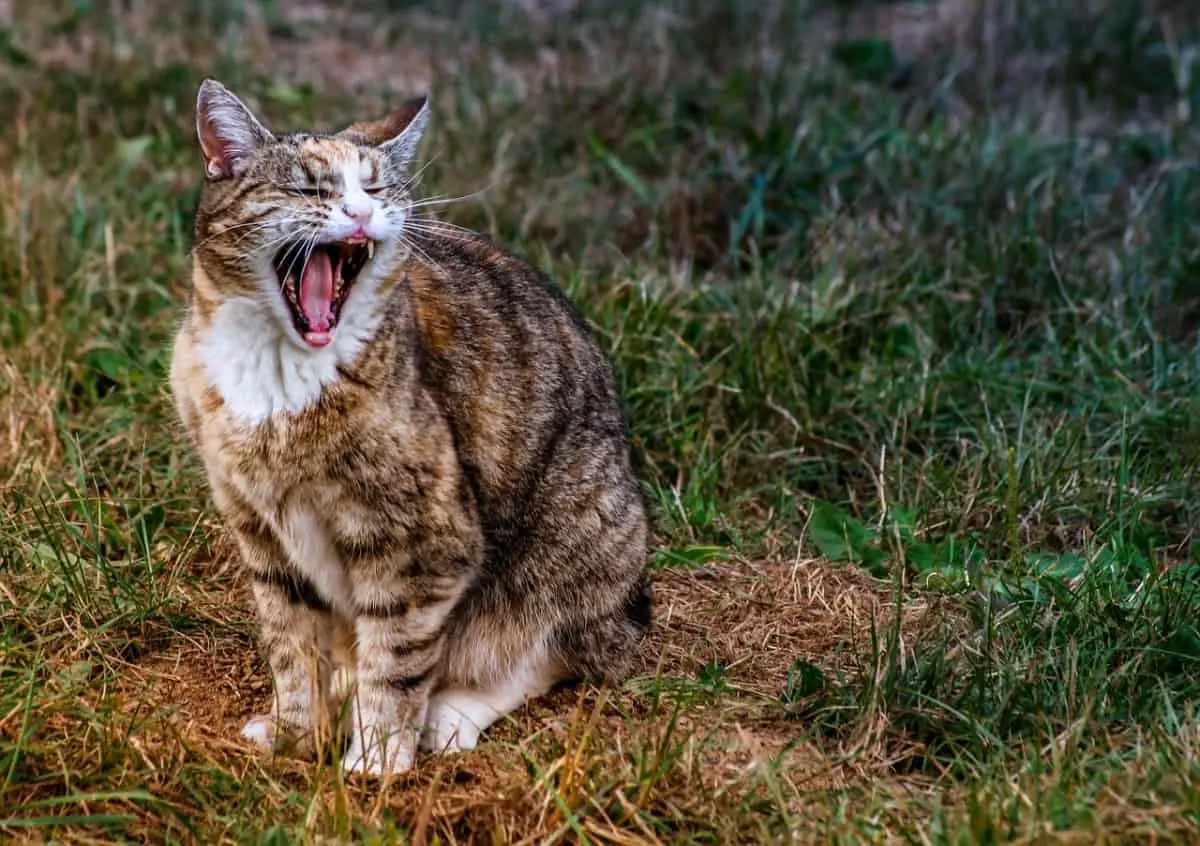You probably have not seen your cat meow at other cats. But you will have heard your cat meow at you and wondered why he said. Cat body language meow what are they saying?
There is a valid reason for the meow, it’s just that right now you don’t understand what that is.
In this article, we explain why a cat meows at people and what they are trying to communicate when they do.
[su_box title=”Cat Meow Meanings”]If you are in a hurry as most of are then I am going to show you the answer to your question “Cat body language Meow” in the shortest way possible. You obviously want to know what your cat is saying. It is important to be aware of this and once you know your relationship will improve drastically. If you GO HERE I want you to watch a short video that will give you all of the answers. It is a method that I have used as well as thousands of cat owners just like you and is proven to work. Just take a look now.[/su_box]
Why Cats Meow at You?

Firstly, to be clear, your cat meows at you because they are trying to communicate with you. Adult cats will not meow at other cats. Rather, they send messages and signals through body language, smell, touch, and various facial expressions.
A meow is intended to be a human-directed conversation. Your cat has learned that they cannot communicate with humans as they do with their fellow cats, and that is why they choose to meow at us.
Scientists have reason to believe that cats have amazingly learned to refine the “meow” language to converse with people.
As owners, we are effective parents to our cats. So it is really important that we understand what a cat is trying to say. This is especially critical when it comes to discomfort and pain because cats are quite subtle when they start to feel unwell. So we need to look for signals to understand what they are saying.
Living with a vocal cat, you will have noticed that they have alternative ways to meow with many variations in the meow quality and tone. If your cat wants attention or food, the meow sound will have a pleasing tone to it.
Should your cat be annoyed or angry, then the meow sound will be very unpleasant. It is meant to be, so they get our full attention.
Here we list some meows in cat language so that you get a better understanding of what your cat is trying to say:
- The Quick and Short Meow: This is a greeting meow, signaling hello.
- Multiple Meows: After a long day at work, you come home, and your cat has missed you. When your cat has not seen you for a while, they will meow many times to signal that they are excited to see you.
- The Mid-Pitch Meow: This meow is a plea to you. This usually signals that they want attention or food.
- The Drawn Out Meow: This means that your cat has a demand. This could be something like, “let me go outside now!”
- The Low Pitch Meow: You have done something wrong. This is your cats’ way of complaining at you.
- The High Pitch Meow: Be wary as this means that your cat is in pain or angry. Check you haven’t done anything silly by accident, like stand on his tail and then look for other possible injuries.
meowing is not the only way cats will try and talk to you. They may chatter, chirp, or purr.
However, they meow at us for a variety of reasons, and it is up to us to determine whether they are ok and figure out what they need. These are some of the reasons why your cat will meow at you:
-
- Stress: When your cat is stressed, it will be more vocal than usual. We took our cat to the vet, which obviously stressed him as he meowed continuously while we were there.
- Hunger: You will always know when your cat is hungry as they will have perfected a particular meow. This is probably the first type of meow you will become accustomed to.
- Attention: There will be times when all your cat wants is your attention. If there is no obvious motive for the meow, try giving your cat some attention. play with him and see if he appreciated that.
- Entering the home: A cat that is locked outside will want to re-enter at some point. He will meow until you let him back in.
- In Heat: Yowling and meowing are common when a female cat is in heat.
- Content and Happy: At this point, your cat will not meow. They will purr. But beware, as sometimes purring can mean that they are in pain. If your cat purrs, check him and make sure that he is not injured.
Nocturnal Meowing

Cats usually sleep for 16 hours of the day and become active at night. Whether they are indoors or outdoors, they will conduct mouse-patrol, which may be annoying, but it is totally normal behavior.
The more savvy and determined cat will visit bedrooms, and snuggle into sleep with you for part of the night until he decides that you have both had enough sleep.
First, it will offer you loving nudges to the head, or nibble your toes or nose, or maybe even drop a few toys on your head in a bid to rouse you.
When you finally get out of bed, the cat will scamper ahead of you to its food bowl indicating that you need to fill it. . Your cat has finally managed to train you!
Handling Your Cats’ Meowing
Surrendering to your cats meow-demands will teach the cat that hassling you is effective in getting him what he wants. But never forget that there are health issues that can cause excessive meowing.
Yowling is common in old cats or deaf cats and those suffering from Alzheimer’s. This can also happen when your cat is stressed or suffers from separation anxiety. More worryingly, yowling is common in cats with heart, thyroid, or kidney problems.
The only way to understand if your cat is yowling through a health issue is to ignore your cat. So don’t get out of bed to feed it or indulge in games.
In fact, don’t spray him with water or even yell at him. Give him no attention at all. This will be hard to do when he is paw-patting you or yowling so loudly that your windows shake. But it is the only way to distinguish between a healthy yowl or a yowl that you need to be concerned about.
Use Tough Love to Stop the Meowing

There are things you can do to help you ignore the meowing. Close your bedroom door, wear earplugs, or confine your cat to a room on the far side of the house.
Sometimes it can take months to change this behavior, especially if it’s been happening for a while.
Their behavior will be worse just before it stops. Behaviorists label this as an extinction burst. So be warned and do not give up. You can do this or be at the beck and call of your cat forever.
Conclusion
Cats don’t meow for the sake of it. They do so to tell us how they feel or what they want. We must listen carefully to our cat when it is trying to communicate with us.
When we understand our cat, we help build a beautiful, long-lasting, and loving connection. This connection will be a lovely thing.
[su_box title=”Affiliate Disclosure”]This website is supported by its readers. Please assume that all links are affiliate links. If you make a purchase from one of the links we will make a commission from Amazon. Thank you.[/su_box]




